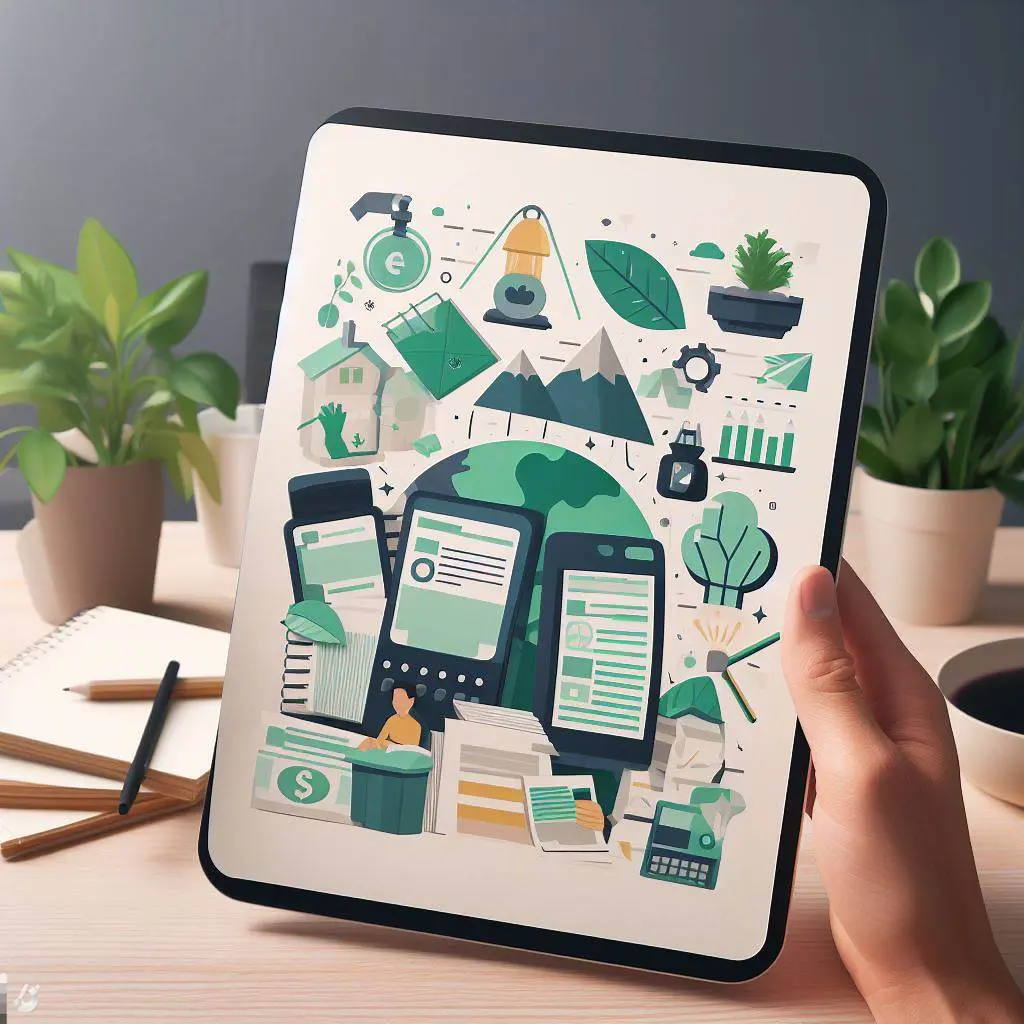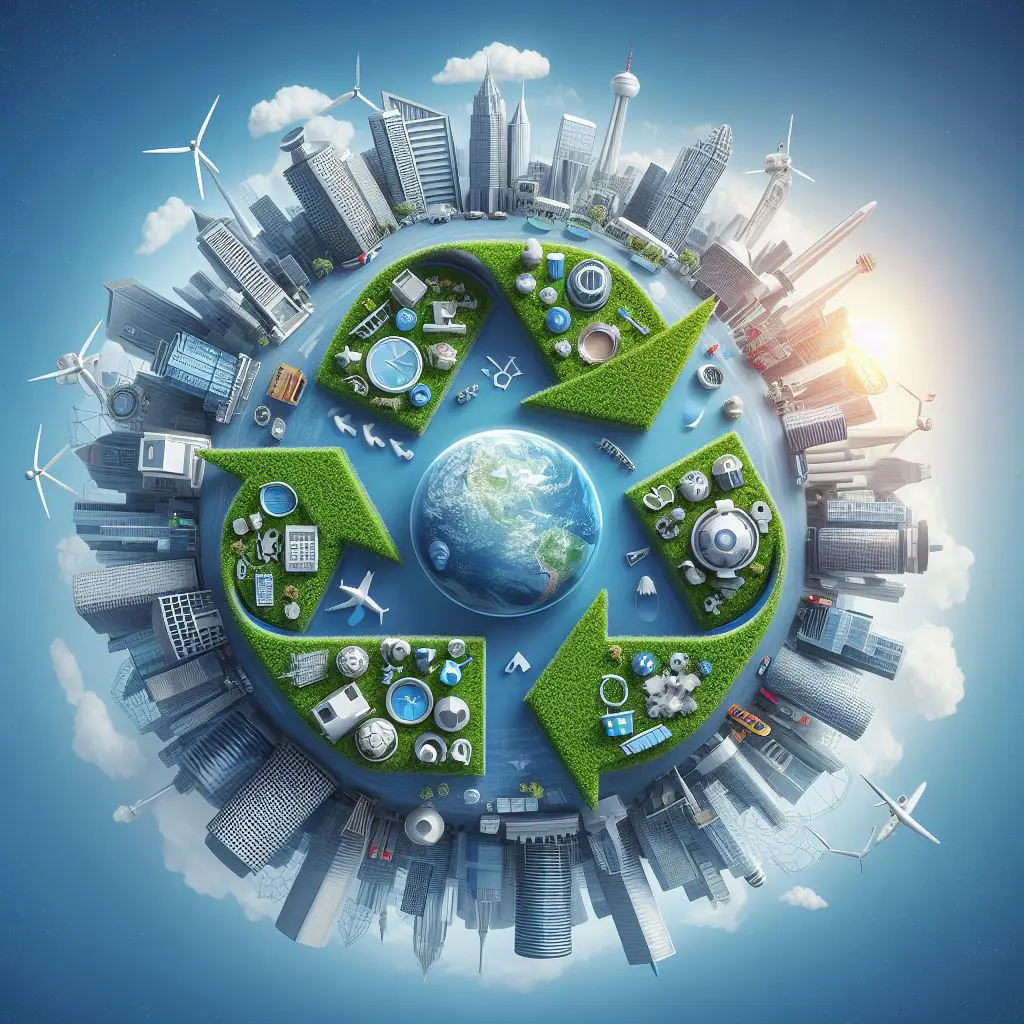Let us explore a business world where “sustainable business practices” are not just buzzwords but they are a reality. Imagine a business world where tackling climate change is just as important as making a profit. Here we are going to explore how businesses are rethinking their business model to being more eco-friendly, socially responsible and embracing sustainable development.
Corporate sustainability aims to find the sweet spot where companies can thrive while also looking after our future. So, buckle up, because we are about to peek into some innovative ways in which businesses are turning green dreams into everyday reality, without giving too much away yet.
Understanding sustainable business practices
Sustainable business practices are an essential component of modern business strategies that guarantee long-term success and a positive social impact. These sustainability practices are based on core ideas such as economic viability, environmental stewardship, and social responsibility.
Businesses can develop profitable business models that simultaneously improve society and the environment by combining these elements. Dissecting these practices into their constituent parts and analysing how they work together to advance sustainability are necessary steps in the analysis process.
A working definition
By looking at these three terms, you can define sustainable business practices more easily:
- Sustainable – resources are used to ensure their availability for future generations, thanks to sustainable practices
- Business – establishments that offer products or services
- Practices – tailored protocols for executing duties or processes inside an organisation

Adopting sustainable business practices protects the planet
Combining the above three words defines “sustainable business practices” as:
“Is about businesses, operating in a way that is vigilant and mindful of the future. It is like they are making sure the way they operate today does not ruin the chances of having a decent world to live in, during future decades. Sustainable businesses operate to routines and methods that are all about balancing making a profit with keeping the planet happy.”
Adopting corporate sustainability as a strategic approach to unlock potential
Let us now talk about corporate sustainability. It is big news in the business world right now. Companies increasingly realise that sustainable business initiatives are smart initiatives; it is no longer just about being nice; it is smart business. Adopting a sustainability strategy is visionary, it is thinking long-term and not just chasing short-term profits and quick wins.
Businesses are becoming increasingly creative in how they find ways to reduce waste and better use natural resources. Corporate sustainability efforts focusp on integrating eco-friendly practices into every part of the business. This includes sourcing materials, managing energy, reducing consumption, and many other approaches.
But even better, is that customers love this! Environmentally aware customers love to support brands, which match their aspirations, especially green-related initiatives. Astute businesses are using sustainability to open new opportunities and to create new marketplaces, sometimes through innovations. Where this happens, it is a win:win. It is business, the planet, and customers all in harmony and being “ahead of the game”! This is a whole new way of thinking about business – sustainable, responsible, and forward-thinking.
Green business initiatives – innovations and trends
Businesses are embracing green business initiatives to make their operations more ecologically friendly because of their growing popularity. Recycling bins in the workplace are no longer sufficient; instead, meaningful, and innovative steps that lessen their detrimental effects on the environment are needed.
These programmes, which address a wide range of topics from sustainable supply chains to renewable energy, demonstrate that adopting a greener lifestyle is a wise business move rather than a fleeting trend. Customers are another scenario where environmentally conscious businesses clearly benefit.

Eco-friendly composite materials are increasingly used in manufacturing
Examples of current green innovations in various industries
Listed below are twelve recent green business practices and innovations across various industries:
1) Biodegradable packaging in retail
The retail industry is ditching plastic for sustainable packaging and biodegradable options. This switch helps reduce waste massively, giving help to the planet. These sustainable packaging solutions are also welcomed by eco-conscious shoppers.
2) Coral reef restoration in marine conservation
Restoration of coral reefs is actively pursued by the maritime industry. By raising and replanting new coral, they are contributing to the restoration of marine ecosystems. It is more than just pretty; it is essential to marine biodiversity and helps lessen the impact of climate change on our oceans.
3) Eco-friendly composites in manufacturing
The manufacturing industry is going through a rapid period of increased use of composite materials increased use. There are many advantages of using composite materials compared to traditional plastics and metals. This is particularly the case for environmentally friendly reasons as composites are manufactured with natural or recycled materials. These products are not only lighter, but stronger and make a real difference to the environment.

Sustainable fashion is creating innovations in this polluting industry
4) Eco-friendly fabrics in fashion
The fashion industry is (surprisingly to some) a leading polluting industry. The use of sustainable materials though is reversing this statistic. Leading brands are making efforts, for example, for organic or recycled cotton:
- M&S – 100% of cotton used was sustainably sourced by 2019
- H&M – has pledged to use only 100% recycled or sustainable cotton by 2030
- Primark – pledges that by 2027, all cotton be will organic, recycled, or sustainable
Similar sustainability initiatives are being made with recycled polyester, sustainable wool, and other sustainable fabrics such as bamboo, hemp, linen, and tencel.
5) Electric vehicles in automotive
In widespread news, is the move by automotive manufacturers to transition to electric vehicles. Driven by legislation and regulations, this initiative requires infrastructure changes, which is another business opportunity. Electric vehicles are more technologically advanced and will lead to a significant improvement in the world’s environment (provided that the electricity to power the vehicles originates from green-friendly and ideally renewable energy origins).
6) Energy-efficient appliances in home goods
Home appliance manufacturers are striving to deliver energy efficiency to their goods. Products such as cookers, refrigerators, washing machines, etc., use lots of power. Manufacturers with lower energy consumption products will differentiate themselves from competitors. They can promote their products will save energy and as a result achieve higher sales and business success.
7) Green building materials in construction
The construction industry is increasingly embracing sustainable materials, reflecting a growing awareness of environmental responsibility. Environmentally friendly practices such as using bamboo flooring and recycled steel are becoming standard in new buildings, marrying durability with sustainability.
This shift is not just about using greener materials; it is about constructing sturdy structures that are kinder to the planet. Alongside these materials, innovations such as energy-efficient insulation made from recycled textiles and low-VOC paints are enhancing building sustainability. The industry’s focus extends beyond immediate construction benefits, encompassing long-term considerations like the recyclability of materials and energy efficiency in building operations.
8) Plant-based alternatives in food & beverage and other industries
Plant-based food and products have created a new industry of their own. In the UK alone, plant-based food (e.g., cheese, cream, desserts, ice cream, milk, meals, meat, seafood, spreads, yoghurt) is a c£963.8m market in the UK in 2022.
In non-related to food and beverage, plant-based opportunities are growing for baby products, beauty & cosmetics, cleaning products, clothing & textiles, dyes, furniture, gardening supplies, home decor products, packaging solutions, pet products, stationery, and vegan leather goods.
9) Solar-powered solutions in technology
Of course, another sustainable business best practice is to adopt solar power. More businesses are adopting this renewable energy source than ever before. Data centres have seen the advantage of avoiding high electricity prices by switching to solar panels. Solar power is a way to save money whilst aiding the environment.
10) Sustainable fishing practices in seafood
For decades, sustainable fishing has been a beacon leading other industries to sustainability. In the UK, this was largely driven by the EU, which has instigated quotas to ensure that the oceans are healthier and more sustainable. In the medium-long term, this means we will not run out of our favourite seafood. Other industries could benefit from sustainability by restricting the use of scarce natural resources wherever possible and moving to new resources, such as composites.
11) Waste-to-energy in waste management
The newest innovation in waste management is converting waste into energy. It is a creative solution to the waste issue that also produces electricity. This business model accomplishes two goals at once.
12) Water-saving techniques in agriculture
These days, smart irrigation systems are used by farmers. These techniques maintain the crops’ growth while using less water. It is revolutionary for water conservation.

Going paperless is great for the environment
Implementing environmental impact reduction
Let us now discuss how to reduce the environmental impact of business. This focuses on making changes that are good for the planet and often, your wallet too. Listed below are seven surefire techniques as to how business are reducing their own environmental impact in sustainable business operations:
- Eco-friendly product sourcing – choose suppliers who also embrace more sustainable business practices (perhaps sustainable brands) to help reduce a company’s carbon footprint
- Energy-efficient lighting – swap out old bulbs for LED ones, they last longer and have lower energy usage
- Going paperless – ditch the paper; embrace digital as it saves deforestation, reduces carbon emissions, and simplifies information sharing and costs
- Green web hosting – opt for web hosts that use renewable energy; it is a smart environmental sustainability move in the digital age
- Recycling programs – set up bins for recycling – it is a small step with a positive impact
- Reducing water usage – install low-flow faucets and toilets to cut down on water waste
- Telecommuting options – letting staff work from home means less commuting, which equals fewer emissions
The circular economy – a model for business sustainability
For businesses, embracing the circular economy is like breathing fresh air. Thinking differently about our patterns of production and consumption is essential to allowing the planet some breathing room.
Explaining the circular economy model
A recent addition to improving business sustainability is the circular economy. It means adopting a “make, use, reuse” mindset in place of the outmoded “make, use, dispose” paradigm. This implies that goods are made to last longer, be repaired, or be recycled rather than winding up in a landfill. It is an entirely new way of thinking that can help the environment and help businesses to save money.

The circular economy
How businesses can implement circular economy principles
So, how can companies implement the circular economy idea? All it takes to make a significant impact is a small amount of consistent action from business leaders. Seven recommendations for bringing the circular economy into a sustainable business are as follows:
- Collaborations for recycling – join forces with businesses that recycle. They have the knowledge and ability to complete the circle
- Eco-design – start by creating products that are simpler to repair or recycle. Like they were granted another chance at life
- Leasing models – leasing products are preferable to selling them. After that, you can return them in this way for remodelling and rerelease
- Material recovery – invest in technologies that recover and reuse materials. It resembles searching through your own trash for treasure
- Repair services – offer product repair services. It keeps customers coming back and boosts their loyalty
- Sustainable supply chains – select suppliers who adhere to circular principles as well. Making the supply chain more sustainable overall is the aim
- Take-back schemes – customers should be encouraged to return stale goods. Reusing materials is a great method to prevent them from ending up in landfills
Final thoughts
Alright, so wrapping this up, we have chatted about how businesses are seriously adopting sustainability approaches. It is not just about being eco-friendly for the sake of it; it is about smart, long-term moves. We have seen how green initiatives are shaking things up in industries from fashion to technology, and it is exciting.
Plus, there is the whole circular economy, which focuses on making and using resources in a way that keeps the planet in mind, this is an emerging new trend in business. What is clear is that being sustainable is no longer just a “nice to have”; it is becoming a must-have, and it is winning over customers and helping sustainable businesses stand out. In a nutshell, the businesses are increasingly seeking a sustainable future, this is not just good for the earth, it is great for business too.
Contacting DTC
Well, we have now completed our post, which answers “Why are sustainable business practices important?” We are great believers in corporate sustainability here at DTC and are experts in the composites industry, which drives many green business initiatives and environmental impact reduction.
Join the DTC Hub today and enhance your supply chain! Place orders, manage your stock consumption, report on stock usage and track compliance, and a lot more.
Why not Contact DTC using these methods to see how we can help your organisation?
- Phone – 023 8025 1100
- Email – sales@dtc-uk.com
- Contact page – click this link

